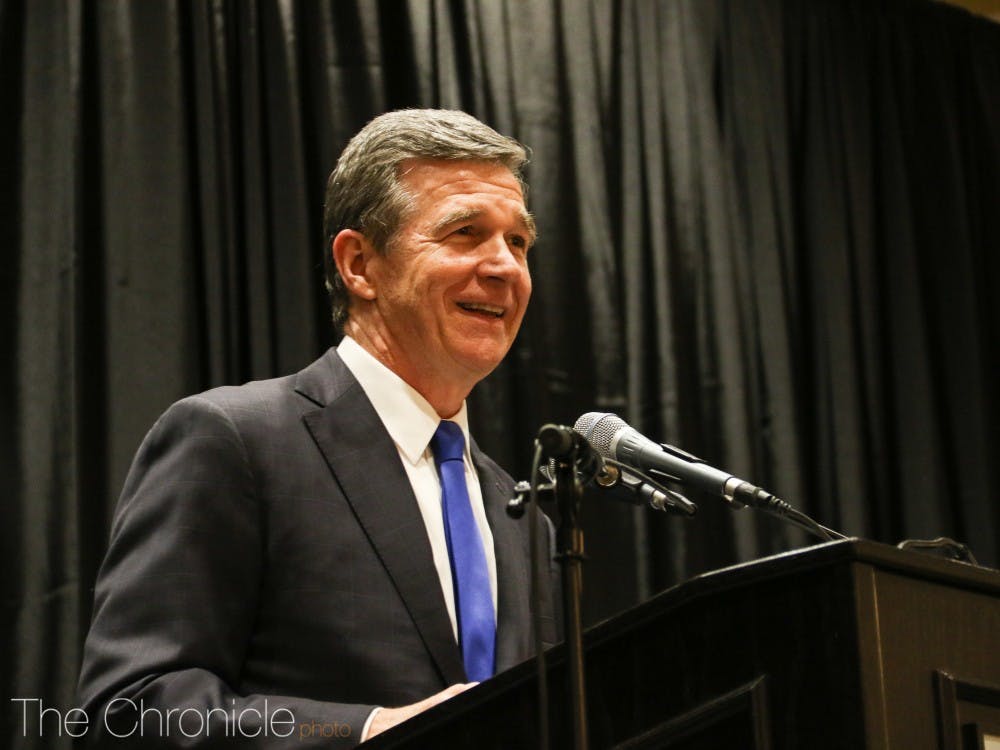Gov. Roy Cooper declared North Carolina to be in a state of emergency Tuesday in response to the coronavirus spreading further into the state.
As of March 10, seven people in North Carolina had tested positive for COVID-19 and are in isolation while health officials work to identify those who had been in close contact with the individuals recently.
The first case in North Carolina was identified March 3 in Wake County in an individual who returned to the state from the site of an outbreak, a long-term care facility in Kirkland, Wash. Two days later an individual who returned from Italy tested positive for COVID-19 in Chatham County.
In a media briefing Tuesday, Cooper announced that the coronavirus task force in North Carolina is not currently recommending that large events and conferences be canceled but is continuing to release recommendations to minimize risks at these events. Members of the task force announced that they are loosening the criteria for testing in the wake of declaring a state of emergency, and told the community to expect an increase in testing as of March 10.
Forty-four people have been tested in the state as of 11:45 a.m. Tuesday, and 25 people were in queue to be tested later today.
But the state has been facing a shortage of supplies for testing, leading state health officials at the North Carolina Department of Health and Human Services to look for supplies from sources outside of the Centers for Disease Control and Prevention, like LabCorp, a laboratory and drug development company based in Burlington, N.C.
Mandy Cohen, secretary of the North Carolina Department of Health and Human Services, reported March 6 having access to supplies for 150 tests. After communicating with the manufacturer directly, supplies for 500 additional tests were to be made available.
The Duke community has yet to have a reported case of COVID-19, and there are no patients for coronavirus at Duke University Health System, as of a March 5 email to the Duke community from University administrators. The Duke academic calendar remained unchanged at the time of their email, but that the administrators confirmed the University is “monitoring the situation and will respond should that become necessary.”
“Over the next week, we will be communicating with deans, department chairs and faculty about how best they can prepare in advance should it become advisable for Duke to end on-campus classes sooner than indicated by the Duke calendar. We hope this will not be necessary but want to be prepared,” the email stated.
Members of the Duke community who traveled to Level 2 or Level 3 risk countries must submit to a “mandatory 14-day self-quarantine” before they would be able to return to campus, according to the email. Any student self-isolation required will be in East House, a residence hall on East Campus, which is “equipped to accommodate and support students under the direction of Duke Student Health,” according to the March 5 email. Off-campus students would be mandated to self-quarantine in their own houses and apartments.
Universities in North Carolina and across the country have canceled in-person classes or implemented plans for self-quarantining due to the spread of the coronavirus.
The University of North Carolina at Chapel Hill is implementing a self-quarantine plan similar to Duke’s for individuals travelling to high-risk locations, but may also enforce a mandatory 14-day quarantine on students travelling domestically to states that have declared states of emergency—California and Washington—and public health emergencies—namely Florida. UNC-Chapel Hill has asked students returning from countries affected by coronavirus to self-quarantine off campus for 14 days before coming back to school.
Students at Harvard University were instructed to move out of their dorms by Sunday and will move classes online beginning March 23. Ohio State University has suspended all in-person classes until at least March 30.
All classes at Princeton University will shift to being online starting March 23 until April 5. Columbia University canceled March 9 and March 10 classes to allow for the week’s remaining classes to have enough time to shift to online.
Vanderbilt announced Monday night that all classes would be canceled until March 13 and that beginning March 16 in-person classes would be suspended until at least March 30, moving online and to other alternative learning formats.
Correction: An earlier version of this article incorrectly stated that universities in North Carolina and nationally have canceled classes and was updated at 2:25 p.m. to reflect that such universities have canceled classes or have planned for self-isolation procedures. The Chronicle regrets the error.
This story will be updated as additional information becomes available.
Get The Chronicle straight to your inbox
Signup for our weekly newsletter. Cancel at any time.

Stefanie Pousoulides is The Chronicle's Investigations Editor. A senior from Akron, Ohio, Stefanie is double majoring in political science and international comparative studies and serves as a Senior Editor of The Muse Magazine, Duke's feminist magazine. She is also a former co-Editor-in-Chief of The Muse Magazine and a former reporting intern at PolitiFact in Washington, D.C.

